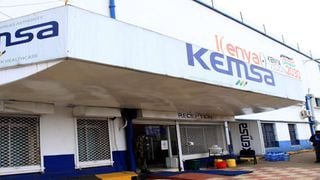
Kenya Medical Supplies Authority offices in Industrial Area, Nairobi.
News
Premium
Kemsa gravy train: How agency kept 581 ghost workers
The Kenya Medical Supplies Authority has been paying 581 ghost workers for years, the Nation has established.
Latest report shows Kemsa had 922 employees on its payroll, more than 170 per cent above its approved staff establishment of 341.
The details are contained in a report released by the action plan and medium-term reforms working committee that was recently appointed to institute reforms at the agency.
The task force also revealed that Kemsa failed to meet the market demand and had been operating at 18 per cent productivity against the target performance of over 90 per cent.
“The agency is suffering from below-par productivity, with the order fill rate standing at 18 per cent against a target performance of over 90 per cent. Kemsa’s order turn-around time is an average of 46 days,” the report shows.
Out of the 11,000 orders made to Kemsa this year, only 345 were serviced, which is below the agency going by the financial crisis. It’s owed Sh6.4 billion and owes its creditors Sh4.5 billion.
Kemsa board chair, Ms Mary Mwadime, said the agency is underperforming and unable to meet clients’ needs, particularly delivery of essential to the counties.
“The agency is largely underperforming and unable to meet clients' urgent needs, particularly the delivery of essential medicines to the counties, this has endangered the lives of Kenyans,” said the chair.
She said the release of all staff to work from home was a procedural formality to facilitate the review of the organisational structure.
Governors yesterday resolved to engage alternative medical suppliers for drugs to ensure there’s no shortage.
The resolution follows the laying off of over 900 Kemsa staff. The NYS and Kenya Defence Forces have been enlisted to oversee operations of the agency. The move has, however, been halted by the court.
Most public hospitals have for the last six months been suffering a chronic shortage of critical and basic drugs with many patients dying of easily curable disease, thanks to procurement scandals at Kemsa.
Counties received their last disbursement of drugs in April. Ever since, hospitals have been operating with the available stock with some purchasing essentials from other suppliers.
In Kisumu, Taita Taveta, Baringo, Bungoma and Kakamega, patients have been buying drugs from private chemists.
The governors have also called on the restructuring of the procurement and distribution system of health products to the counties. They say this will accord accountability to both governments.
“The demands of the 47 counties for medical supplies and equipment are higher than those of the national government, we should be allowed to procure,” the Council of Governors (CoG) said.
The decision by the county chiefs comes after a sustained push to stop Kemsa’s monopoly. On Monday, a new Bill was tabled in the Senate that seeks to stop the provision that mandates counties to purchase drugs from Kemsa.
Sponsored by ODM nominated Senator Naomi Shiyonga, it seeks to amend the Kemsa Act that requires that all counties procure drugs and medical supplies from the authority as the first point of call.
The House last year introduced a jail term of two years or a penalty of Sh2 million for anyone who defies the decree.
Before the Act was amended, counties had the choice of buying from independent suppliers or the Mission for Essential Drugs and Supplies, owned jointly by the Kenya Conference of Catholic Bishops and the Christian Health Association of Kenya.
The county chiefs had proposed that since Kemsa was at that point only supplying 70 per cent of medical needs, Meds should get 20 per cent of the 30 per cent Kemsa deficit, and the other 10 per cent be from other suppliers.
The governors said the role of the national government is only restricted to delivering health services to national referral health facilities.
“While delivery of most of the essential health services is assigned to counties, we have responsibility for county health facilities from level one to level five, the role of national government in the delivery of health services is restricted to national referral health facilities,” stated Mr Martin Wambora, CoG chair.
The CoG also called upon institutions tasked with the responsibility of safeguarding public resources against plunder and misuse to investigate and bring to book all those who will be found culpable of mismanaging Kemsa.




